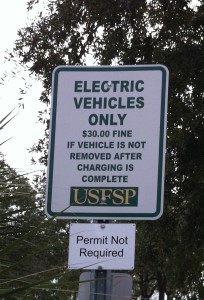
In the past four months, Kira Barrera has received $120 in parking tickets on campus # even though she has a $173 commuter parking permit stuck to her windshield.
Barrera, an environmental science graduate student, is one of about six people who regularly drive an electric vehicle to campus and take advantage of the two free charging stations near the Tavern. Though there is no time limit on the chargers, a policy change made in November restricts use to charge completion. Once the meter shows a full charge, Parking Services patrollers are allowed to issue a $30 ticket.
While hybrid cars usually need about two hours to charge, fully electric vehicles, like Barrera’s Nissan Leaf, may need up to six hours. However, the rate of charge varies and can be tough to gauge.
“It’s an estimate,” Barrera said.
So, even when she arrives on campus in the morning and the meter says it will take six hours for her car to charge, it may be done sooner. And she may be subject to a $30 ticket without knowing it.
With an 85-mile range on her vehicle and commute from Clearwater, she needs to use a charging station every time she comes to campus.
Charging an electric vehicle costs about 11 cents an hour, according to Barrera. Though USFSP’s charging stations are free, Barrera’s parking ticket charges are the equivalent of paying for 1,090 hours of energy.
Barrera took her complaint to Bill Benjamin, purchasing manager for USFSP Parking Services, in early January. Over the next two weeks, she received two more parking tickets, the latest on Jan 22. While the citations were issued for charge completion, neither had a chalk time noting when the vehicle was found fully charged.
Barrera appealed both tickets to Parking Services but received no response.
On Jan. 24, she sent an email to a group of campus employees and student leaders, informing them of the issue.
Benjamin replied saying that following his meeting with Barrera, he asked his employees to wait thirty minutes before issuing a citation for charge completion. That was the first Barrera had heard of the policy change, and though she doesn’t doubt its implementation, she said she hasn’t seen evidence of it.
Benjamin told The Crow’s Nest he did not make the change publicly known. “Really, this was just to accommodate her (Barerra),” he said.
Still, the 30-minute leeway is not a complete solution for Barrera. In her meeting with Benjamin, she offered to create a contact list of the all the regular electric vehicle drivers on campus, so Parking Services could contact them when their charges complete.
“If they have time to drive by every hour to look at my car, I don’t see why it would be an inconvenience,” Barrera said, adding that sending a text to students would be simple for Parking Services workers.
In response, Benjamin explained that with 22 parking lots to monitor (counting each level of the garage separately), parking patrollers do not have the time to contact drivers.
University spokesman Tom Scherberger compared the policy to parking at a city-run metered spot.
“The St. Pete Police Department doesn’t call you before putting a ticket on your car,” he said.
Initially, there was no time limit placed on use of the charging stations. The rule restricting use to charge completion was implemented in November in an effort to make the stations “accessible to everyone,” Benjamin said. Along with placing signs citing the regulation at each station, Parking Services employees also left notices on the windshields of electric vehicles, which outlined the new policy.
Benjamin said people coming to campus should know how long their cars need to charge and shouldn’t take advantage of the charging stations at USFSP when there are others available in the city. Barrera said she uses the stations at the Dali Museum when the ones on campus are occupied.
Barrera uses an app made specifically for her car that monitors its charge from a distance. Though she can request an update at any time, the app is not programmed to send a notification when the car is fully charged. And even when she requests an update at just the right time, she can’t always leave class or her job at the U.S. Geology Survey (just west of campus), to move her car.
Barrera also takes classes in Tampa, and though there are only two charging stations on campus, they are not monitored by time or charge completion. Instead, drivers use an app that specifically monitors the two chargers and lets them know when a charge is complete or a spot opens up. When the chargers are occupied, drivers have the option of parking in designated holding spaces right next to the stations.
Benjamin said he has been in contact with the Tampa campus as well the Center for Urban Transportation about possible solutions. But for now, the charge completion limit remains.
USFSP’s charging stations were funded through a grant from the U.S. Department of Energy. Benjamin said they were supplied on the basis there would be no charge for two years, however, the school has had to pay for electricity since installation. Since universities are not authorized to charge for electricity (only electric companies can do that), USFSP cannot charge for use of its stations.
USFSP Parking Services does not receive state funding. Money collected from parking citations is used to pay for maintenance of parking lots, signage, electricity, employee salaries and the bond on the parking garage.
This story has been modified since original publication.
news@crowsneststpete.com


